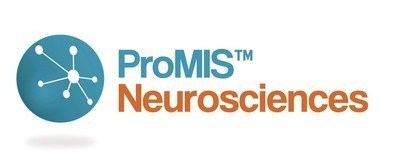Nature Research Journal highlights data
supporting the therapeutic potential of PMN310 against the toxic
oligomer form of amyloid beta, a root cause of Alzheimer's
disease
TORONTO and CAMBRIDGE, MA, July 9,
2019 /PRNewswire/ - ProMIS Neurosciences, Inc. (TSX: PMN)
(OTCQB: ARFXF), a biotechnology company focused on the discovery
and development of antibody therapeutics targeting toxic oligomers
implicated in the development of neurodegenerative diseases,
announced that supporting data for PMN310, its lead antibody
candidate for Alzheimer's disease (AD), have been published in
Scientific Reports, a journal of the Nature Research family. The
open-access study is available on the Scientific Reports
website using the following direct link:
https://rdcu.be/bJeLB.

In the manuscript, "A Rationally Designed Humanized Antibody
Selective for Amyloid Beta Oligomers in Alzheimer's Disease," the
authors show PMN310's selectivity for amyloid-beta oligomers
(AßOs), the toxic form of Aß currently believed to be a root
cause of AD. The results of activity assays show that PMN310
inhibits both the spread and toxicity of AßOs in vitro, and, in
mouse studies, that PMN310 prevents AßO-induced loss of memory
formation and reduces both synaptic loss and inflammation.
PMN310 compared favorably to other Aß-directed antibodies,
showing a lack of adverse event-associated binding to Aß deposits
in AD brains, and greater selective binding to AßO-enriched AD
brain fractions that contain Aß neurotoxic species.
"As our understanding of Alzheimer's disease has advanced, it
has become increasingly clear that disease development is not
directly related to plaque burden as was the original belief when
clinical studies were designed for the failed amyloid-targeting
antibody drug candidates," said Dr. Neil
Cashman, study author and Chief Scientific Officer for
ProMIS Neurosciences. "We now know soluble toxic Aß oligomers
are the correct target for therapy. However, selective
targeting of Aß oligomers has remained elusive, largely due to the
limitations of traditional antibody development methods. Our
data show once again the power of our novel drug discovery and
development platform to generate selective antibodies that
neutralize the toxic oligomers of misfolded proteins, in this case,
amyloid beta oligomers". Dr. James
Kupiec, Chief Medical Officer of ProMIS Neurosciences, added
that "Greater selectivity for toxic oligomers and the potential to
safely administer high doses of PMN310 should result in enhanced
safety and therapeutic potency. ProMIS has generated a unique
Alzheimer's therapy by applying the lessons of past amyloid
failures to develop an agent that inhibits the pertinent, toxic
form of amyloid. With the emergence of new biomarkers to
speed high-quality therapies through clinical trials, we hope to
rapidly deliver long-awaited therapies to patients and their
families."
Scientific Reports is an open-access journal and is part of the
Nature Research family of journals, which includes Nature, the
leading, international weekly journal of science, and Nature
Communications.
About ProMIS Neurosciences
ProMIS Neurosciences, Inc.
is a development stage biotechnology company focused on discovering
and developing antibody therapeutics selectively targeting toxic
oligomers implicated in the development and progression of
neurodegenerative diseases, in particular Alzheimer's disease (AD),
amyotrophic lateral sclerosis (ALS) and Parkinson's disease (PD).
The Company's proprietary target discovery platform is based on the
use of two complementary thermodynamic, computational discovery
engines - ProMIS and Collective Coordinates - to predict novel
targets known as Disease Specific Epitopes on the molecular surface
of misfolded proteins. Using this unique precision approach, the
Company is developing novel antibody therapeutics for AD, ALS and
PD. ProMIS is headquartered in Toronto,
Ontario, with offices in Cambridge, Massachusetts. ProMIS is listed on
the Toronto Stock Exchange under the symbol PMN, and on the OTCQB
Venture Market under the symbol ARFXF.
To learn more, visit us at www.promisneurosciences.com, follow
us on Twitter and LinkedIn and listen to the podcast, Saving
Minds, at iTunes or Spotify.
The TSX has not reviewed and does not accept responsibility
for the adequacy or accuracy of this release. This information
release contains certain forward-looking information. Such
information involves known and unknown risks, uncertainties and
other factors that may cause actual results, performance or
achievements to be materially different from those implied by
statements herein, and therefore these statements should not be
read as guarantees of future performance or results. All
forward-looking statements are based on the Company's current
beliefs as well as assumptions made by and information currently
available to it as well as other factors. Readers are cautioned not
to place undue reliance on these forward-looking statements, which
speak only as of the date of this press release. Due to risks and
uncertainties, including the risks and uncertainties identified by
the Company in its public securities filings, actual events may
differ materially from current expectations. The Company disclaims
any intention or obligation to update or revise any forward-looking
statements, whether as a result of new information, future events
or otherwise.
 View original content to download
multimedia:http://www.prnewswire.com/news-releases/promis-neurosciences-data-for-alzheimers-disease-clinical-candidate-pmn310-published-in-scientific-reports-300880879.html
View original content to download
multimedia:http://www.prnewswire.com/news-releases/promis-neurosciences-data-for-alzheimers-disease-clinical-candidate-pmn310-published-in-scientific-reports-300880879.html
SOURCE ProMIS Neurosciences Inc.